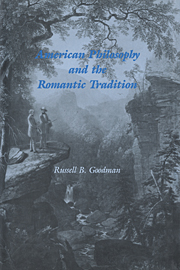2 - Ralph Waldo Emerson
Published online by Cambridge University Press: 07 October 2011
Summary
Emerson's writing will, from the outside, seem vague and inflated, but from inside will acquire a terrible exactness.
Stanley Cavell, “An Emerson Mood”Emerson is a direct link between American philosophy and European Romanticism. Soon after leaving his ministry in the Unitarian church (in part because he no longer believed in the “divine authority and supernatural efficacy” of the communion he administered), Emerson traveled to Europe where he met his heroes Wordsworth, Coleridge, and Carlyle. There is little doubt of their influence on his thought or of Emerson's founding role in American Romanticism. As Harold Bloom observed, “Emerson is to American Romanticism what Wordsworth is to the British or parent version.”
What is less clearly established is Emerson's importance as a philosopher. His thought plays a minor role in many histories and surveys of American philosophy, perhaps because it has no obvious connection with the major American movement of pragmatism. Yet one pragmatist, John Dewey, thought that Emerson was “the one citizen of the New World fit to have his name uttered in the same breath with that of Plato,” and another, William James, thought enough of Emerson to deliver an address to the Emerson centenary celebrations (after rereading his entire corpus), in which he called him a “real seer … [who] could perceive the full squalor of the individual fact, but … also … the transfiguration.”
- Type
- Chapter
- Information
- American Philosophy and the Romantic Tradition , pp. 34 - 57Publisher: Cambridge University PressPrint publication year: 1991



